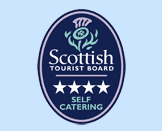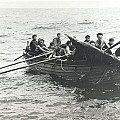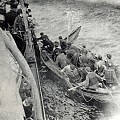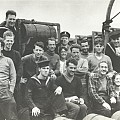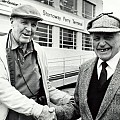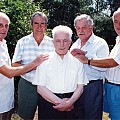


Atlantic Hero
Angus Murray, Aonghas Gusaidh - Rhoda's father and a highly respected figure in the wider community - was born here at 25 South Shawbost in 1907 and died here, peacefully and amidst his family, in the spring of 1996.
But to this day a group of old, increasingly frail Second World War veterans meet each year - with wives and children, grandchildren and great grandchildren - and thank God for what this quiet Lewisman accomplished in nine terrifying days on the open ocean.
It was shortly after noon on 4th August 1942, at just about the darkest point of the war against Hitler, and the RICHMOND CASTLE sailed cautiously home across the North Atlantic. The Union-Castle Line cargoboat was laden with precious, frozen Argentinian beef for a Britain enduring rigorous rationing.
She wasn't in convoy - at sixteen knots, and a thrusting nineteen at full power, she was thought capable of making safe passage alone. But speed and a careful, zig-zag course were not enough: Captain Dierksen and U176 were on her tail, and Dierksen's log of the fateful moment still survives - "Fire treble shot. Estimated speed of vessel fifteen knots, bearing 80 degrees. Hit at funnel level..."
The first all knew on board was the explosion, a tremendous shudder, and then smoke, flame, quiet cold panic. There were sixty men on board and, as the RICHMOND CASTLE listed steeply to starboard, only two of the four lifeboats could be launched. Only twenty minutes after the hit, the RICHMOND CASTLE sank.
A third, capsized boat was with great difficulty righted by desperate men in the water and at length, in the sapping cold and terror, eighteen had struggled into it. Among them was Angus Murray.
Angus had not panicked when Dierkensen's torpedo struck. Quickly he dressed, pocketed his Bible, went about the ship quickly helping others to the boats. He saved a man from the engine room and swam free himself, just as the RICHMOND CASTLE foundered.
Though there were several officers in Angus's lifeboat, posh and educated men, they had no experience of practical seamanship and, quickly, tacitly, Angus - brought up in the Hebrides, who had spent all his days in little sailing boats and by instinctive navigation - was in command.
The captain's lifeboat, near by, said they should make for Newfoundland. Angus quietly demurred. The craft parted...
Angus rigged a sail from two blankets and persuaded the increasingly numb Chief Officer that they should make for Ireland. Night fell; and more nights, and days. Angus had the helm most of the time, taking advantage of a westerly wind, keeping full sail by the sense of the breeze on his cheek. Five days later, on 9th August, he carried his little command safely through a terrifying storm all the long day - a Force 9 gale and mountainous, 50-foot waves - by the simple expedient of shortening sail, from two blankets to one.
He took command of the water supply, and rationed it - four tablespoons, per man, per day. The scant, dry food-ration was all the harder to swallow. He read the Bible aloud, in short portions, to maintain morale, and led in prayer. One day, the lifeboat was beset by sharks - one even charging the fragile thing, in determined bid to upset it.
On the ninth day, the drained, dying men saw a a distant white bow-wave heading towards them - a British corvette, HMS SNOWFLAKE.
The Captain's lifeboat was found later that day, but he and two of his crew were dead; in the third, found three days earlier, nine men hadn't made it.
After a 400-mile voyage in an open boat with no shelter, little food, precious little water and in damp, stinking clothing, all the men in Angus's lifeboat were still alive - but only he still had strength to climb the ropes to the solid, welcome deck of the corvette.
Angus was duly awarded the British Empire Medal "for his skill and resource in bringing survivors to safety in circumstances that would have daunted the bravest", and a later, wartime feel-good movie was based loosely on the heroism of this sturdy seaman from Scotland's Western Isles.
Later in life, Angus raised his family here at 25 South Shawbost, fashioned beautiful woodwork - the self-catering apartment used to be his workshop - delivered school dinners around the island, led the village Sunday School and served Shawbost Free Church as a genial, gracious elder. "He had time for everyone," a local councillor recalled, "no matter how they behaved. I believe he was at peace with both God and man."
For the rest of his life, the men he had guided to deliverance kept in touch, visited regularly, would later visit with their families - and several, at the last, helped lay Angus to rest in 1996.
For his own part, Angus would only say, "I know a little about boats, right enough, and that's all very well, but I am thankful to God that I came out of it alive because that is what I believe."
